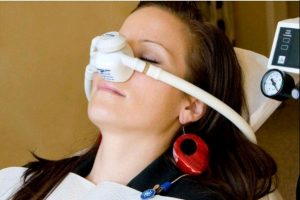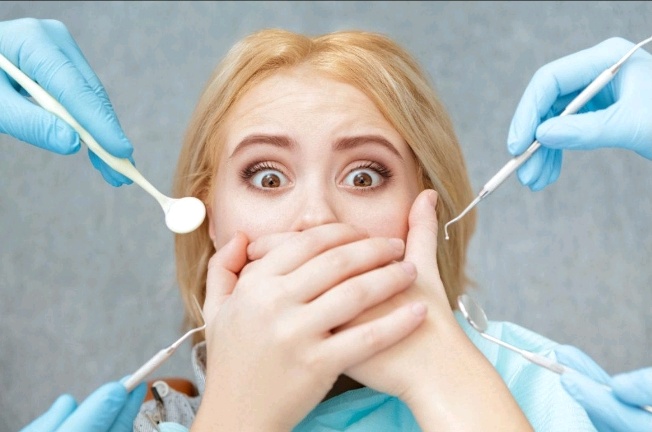Dental phobia also known as ‘dentophobia’ is a real thing amongst adults, especially women. Dental anxiety is a more serious condition than the anxiety itself. Almost seventy-five percent of adults in the United States experience some amount of fear when it comes to visiting a dentist. Out of that percentage, about five to ten percent of them hold a fear strong enough to be considered victims of dental phobia. Those individuals live with a fear so adverse that they avoid dental visits, which can have serious health implications.
Dental phobia is treatable. Without treatment, dental phobia is likely to worsen as time passes by. Thankfully, now there are various ways to curb dental phobia. From therapy provided to combat dental phobia to sedatives and anxiety medication.
Dental sedation is becoming an increasingly popular form of managing dental anxiety. Sedation is the process in which sedatives are used to establish an easy, relaxed and calm state amongst patients. Sedative drugs (depressants, nitrous oxide, anti-anxiety medications, tranquilizers, etc.) are administered into a patient in a variety of ways. Oral sedation dentistry has now become the most common method used in the United States and Canada to mitigate patient fears. This technique is simple and does not require needles. These medications create such a soothing experience that most patients do not even remember their visit to the dentist; almost like they slept through the treatment.
Women and anxiety
According to Anxiety and Depression Association Of America, “From the time a girl reaches puberty until about the age of 50, she is two times more likely to have an anxiety disorder as compared to a man”. Anxiety disorders are also said to occur earlier in women than in men. Some evidence suggests that the female brain does not process serotonin as quickly as the male brain. Evidence suggests that the female brain does not process serotonin as quickly as the male brain does. While various other brain chemistry and hormone fluctuations in the female body can also make them more prone to anxiety and stress. This also makes women more susceptible to dentophobia and dental sedation is highly recommended.
Anxiety during pregnancy
Reproductive events like pregnancy and breastfeeding during the course of a woman’s life are also characterized by hormonal changes that have further been linked to anxiety. Some amount of anxiety amongst pregnant women is normal but chronic anxiety or stress can affect the way an unborn baby grows. Maternal anxiety may alter the blood flow to the baby, making it tough to carry oxygen and other essential nutrients to the baby’s developing organs. Dentophobia can aggravate anxiety and stress. That does not imply that women should stop visiting the dentist when they are pregnant. It is important to visit the dentist for a routine check-up every 6 months in order to maintain oral health. Dental sedation can relieve pregnant women of that unneeded stress although it is sedation is typically deferred to the second trimester.
No memory of the procedure
One of the most important benefits of sedation dentistry is that people often feel like their dental procedure lasted only a few minutes, while it could have lasted for hours in reality. Therefore, women who want to get complex dental procedures, like smile makeovers or extensive rebuilding procedures, done to help them boost their confidence can get them completed in fewer appointments that otherwise require multiple long visits. In many cases, people have little to no memory of the procedure. This can be very helpful, especially for women who are extremely fearful of going through medical procedures.
Elderly women
With old age comes weaker teeth. Elderly patients usually have more dental needs than younger ones. They may require to visit the dentist more often and get more procedures done. Elderly women also have a lower pain threshold which in turn can incite anxiety and make a visit to the dentist a sheer nightmare. Dental sedation, when administered carefully, is very beneficial for elderly patients.
Allergies
Dental sedation is the most convenient and pain-free exercise perfectly suited for women. Nitrous oxide also called “laughing gas”, is a safe and efficient sedative agent that is used in combination with oxygen and is inhaled through a small mask. However, there is always a chance of having side effects. It is important to inform the dentist about any allergies that you may have since the sedative can induce certain allergies. The use of a latex-free nitrous oxide mask is often offered by dentists as they prevent unwanted skin allergies and relieve anxiety. The mask does not put you to sleep. You will be able to hear and respond to any requests or directions the dentist may give. Ultimately, you end up feeling comfortable and relaxed.

While opting for dental sedation it is important to choose a good dentist. Sedation dentistry procedures should ideally be performed under the guidance of a dentist and a set of staff skilled in sedation procedures. For example, oral conscious sedation training typically involves 18 to 25 hours of education. There are various advanced courses available in sedation dentistry that can perfectly equip one for handling such treatments. If you consider yourself an anxious person who is apprehensive about routine dental checkups, you should highly consider looking for a qualified sedation dentist. Experienced sedation dentists spend time with patients to discuss any and all aspects of sedation dentistry. Inquiring about pre- and post-procedure instructions is also a must. This will help you prepare better for a procedure that you want to have.
It is no secret that oral health and hygiene are underrated and most feared due to the anxiety it brings along. But, it is important that one consciously makes an effort to overcome this anxiety and look after their oral health for the benefit of their overall well being. Women, especially, should opt for sedation as it will make them less likely to neglect oral health issues. These issues could eventually build to the point where drastic dental procedures become a necessity, thereby potentially compromising on the looks and functionality of your mouth and smile.
-Written by Ross Geller
Author Bio:
Ross is a blogger who loves to write especially in the Health and dental vertical. He has written many informative blogs in other verticals too like personal development, unique gifting blogs etc.















































